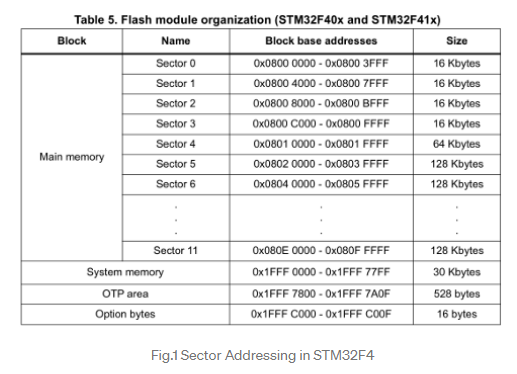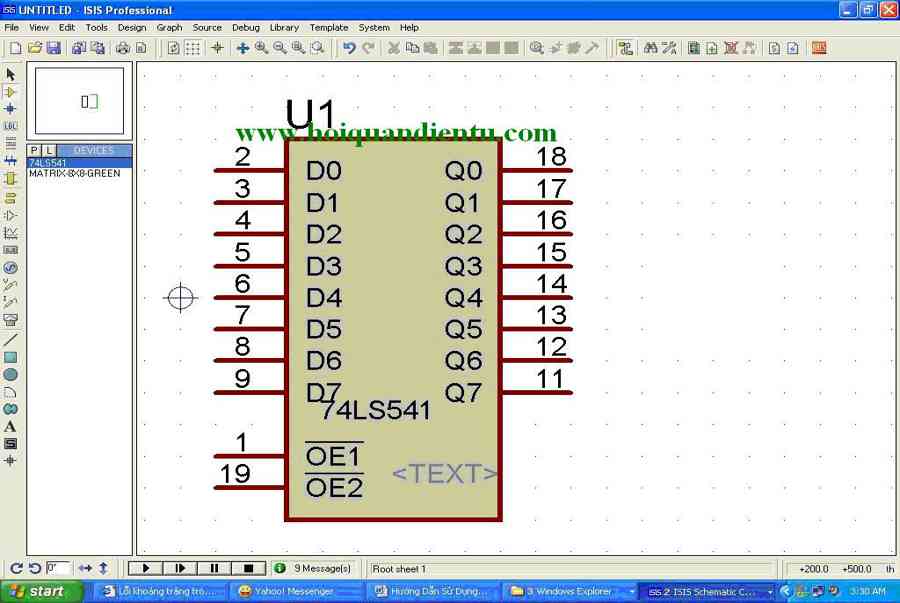Simulacrum, từ simulacrum Latin, là một sự bắt chước, giả mạo hoặc hư cấu. Khái niệm này được liên kết với mô phỏng, đó là hành động mô phỏng .Một...
Lập trình EEPROM FLASH STM32F4 – Linh Kiện Điện tử HdShop

Các sector 0-11 để ghi dữ liệu với chương dùng đế 256kbye thì Chúng ta sẽ lưu eeprom vào phần ô nhớ còn lại .
Chương trình STM32F4 Ghi đọc Flash
#include “stm32f4xx.h”
#include “core_cm4.h”
#include “stm32f4xx_hal.h”
//
#define SYSTEM_SUPPORT_UCOS 1 //¶¨ÒåϵͳÎļþ¼ÐÊÇ·ñÖ§³ÖUCOS
//λ´ø²Ù×÷,ʵÏÖ51ÀàËƵÄGPIO¿ØÖƹ¦ÄÜ
//¾ßÌåʵÏÖ˼Ïë,²Î¿¼<
//IO¿Ú²Ù×÷ºê¶¨Òå
#define BITBAND(addr, bitnum) ((addr & 0xF0000000)+0x2000000+((addr &0xFFFFF)<<5)+(bitnum<<2))
#define MEM_ADDR(addr) *((volatile unsigned long *)(addr))
#define BIT_ADDR(addr, bitnum) MEM_ADDR(BITBAND(addr, bitnum))
//IO¿ÚµØÖ·Ó³Éä
#define GPIOA_ODR_Addr (GPIOA_BASE+20) //0x40020014
#define GPIOB_ODR_Addr (GPIOB_BASE+20) //0x40020414
#define GPIOC_ODR_Addr (GPIOC_BASE+20) //0x40020814
#define GPIOD_ODR_Addr (GPIOD_BASE+20) //0x40020C14
#define GPIOE_ODR_Addr (GPIOE_BASE+20) //0x40021014
#define GPIOF_ODR_Addr (GPIOF_BASE+20) //0x40021414
#define GPIOG_ODR_Addr (GPIOG_BASE+20) //0x40021814
#define GPIOH_ODR_Addr (GPIOH_BASE+20) //0x40021C14
#define GPIOI_ODR_Addr (GPIOI_BASE+20) //0x40022014
#define GPIOA_IDR_Addr (GPIOA_BASE+16) //0x40020010
#define GPIOB_IDR_Addr (GPIOB_BASE+16) //0x40020410
#define GPIOC_IDR_Addr (GPIOC_BASE+16) //0x40020810
#define GPIOD_IDR_Addr (GPIOD_BASE+16) //0x40020C10
#define GPIOE_IDR_Addr (GPIOE_BASE+16) //0x40021010
#define GPIOF_IDR_Addr (GPIOF_BASE+16) //0x40021410
#define GPIOG_IDR_Addr (GPIOG_BASE+16) //0x40021810
#define GPIOH_IDR_Addr (GPIOH_BASE+16) //0x40021C10
#define GPIOI_IDR_Addr (GPIOI_BASE+16) //0x40022010
//IO¿Ú²Ù×÷,Ö»¶Ôµ¥Ò»µÄIO¿Ú!
//È·±£nµÄֵСÓÚ16!
#define PAout(n) BIT_ADDR(GPIOA_ODR_Addr,n) //Êä³ö
#define PAin(n) BIT_ADDR(GPIOA_IDR_Addr,n) //ÊäÈë
#define PBout(n) BIT_ADDR(GPIOB_ODR_Addr,n) //Êä³ö
#define PBin(n) BIT_ADDR(GPIOB_IDR_Addr,n) //ÊäÈë
#define PCout(n) BIT_ADDR(GPIOC_ODR_Addr,n) //Êä³ö
#define PCin(n) BIT_ADDR(GPIOC_IDR_Addr,n) //ÊäÈë
#define PDout(n) BIT_ADDR(GPIOD_ODR_Addr,n) //Êä³ö
#define PDin(n) BIT_ADDR(GPIOD_IDR_Addr,n) //ÊäÈë
#define PEout(n) BIT_ADDR(GPIOE_ODR_Addr,n) //Êä³ö
#define PEin(n) BIT_ADDR(GPIOE_IDR_Addr,n) //ÊäÈë
#define PFout(n) BIT_ADDR(GPIOF_ODR_Addr,n) //Êä³ö
#define PFin(n) BIT_ADDR(GPIOF_IDR_Addr,n) //ÊäÈë
#define PGout(n) BIT_ADDR(GPIOG_ODR_Addr,n) //Êä³ö
#define PGin(n) BIT_ADDR(GPIOG_IDR_Addr,n) //ÊäÈë
#define PHout(n) BIT_ADDR(GPIOH_ODR_Addr,n) //Êä³ö
#define PHin(n) BIT_ADDR(GPIOH_IDR_Addr,n) //ÊäÈë
#define PIout(n) BIT_ADDR(GPIOI_ODR_Addr,n) //Êä³ö
#define PIin(n) BIT_ADDR(GPIOI_IDR_Addr,n) //ÊäÈë
//
// FLASH start address
#define STM32_FLASH_BASE 0x08000000 // STM32 FLASH start address
#define FLASH_SAVE_ADDR 0x080A0000 // Save Address
typedef int32_t s32;
typedef int16_t s16;
typedef int8_t s8;
typedef const int32_t sc32;
typedef const int16_t sc16;
typedef const int8_t sc8;
typedef __IO int32_t vs32;
typedef __IO int16_t vs16;
typedef __IO int8_t vs8;
typedef __I int32_t vsc32;
typedef __I int16_t vsc16;
typedef __I int8_t vsc8;
typedef uint32_t u32;
typedef uint16_t u16;
typedef uint8_t u8;
typedef const uint32_t uc32;
typedef const uint16_t uc16;
typedef const uint8_t uc8;
typedef __IO uint32_t vu32;
typedef __IO uint16_t vu16;
typedef __IO uint8_t vu8;
typedef __I uint32_t vuc32;
typedef __I uint16_t vuc16;
typedef __I uint8_t vuc8;
#define ADDR_FLASH_SECTOR_0 ((uint32_t)0x08000000) /* Base @ of Sector 0, 16 Kbytes */
#define ADDR_FLASH_SECTOR_1 ((uint32_t)0x08004000) /* Base @ of Sector 1, 16 Kbytes */
#define ADDR_FLASH_SECTOR_2 ((uint32_t)0x08008000) /* Base @ of Sector 2, 16 Kbytes */
#define ADDR_FLASH_SECTOR_3 ((uint32_t)0x0800C000) /* Base @ of Sector 3, 16 Kbytes */
#define ADDR_FLASH_SECTOR_4 ((uint32_t)0x08010000) /* Base @ of Sector 4, 64 Kbytes */
#define ADDR_FLASH_SECTOR_5 ((uint32_t)0x08020000) /* Base @ of Sector 5, 128 Kbytes */
#define ADDR_FLASH_SECTOR_6 ((uint32_t)0x08040000) /* Base @ of Sector 6, 128 Kbytes */
#define ADDR_FLASH_SECTOR_7 ((uint32_t)0x08060000) /* Base @ of Sector 7, 128 Kbytes */
#define ADDR_FLASH_SECTOR_8 ((uint32_t)0x08080000) /* Base @ of Sector 8, 128 Kbytes */
#define ADDR_FLASH_SECTOR_9 ((uint32_t)0x080A0000) /* Base @ of Sector 9, 128 Kbytes */
#define ADDR_FLASH_SECTOR_10 ((uint32_t)0x080C0000) /* Base @ of Sector 10, 128 Kbytes */
#define ADDR_FLASH_SECTOR_11 ((uint32_t)0x080E0000) /* Base @ of Sector 11, 128 Kbytes */
/ * Base address of the Flash sectors Bank 2 * /
static uint32_t GetSector(uint32_t Address)
{
uint32_t sector = 0;
if((Address < ADDR_FLASH_SECTOR_1) && (Address >= ADDR_FLASH_SECTOR_0))
{
sector = FLASH_SECTOR_0;
}
else if((Address < ADDR_FLASH_SECTOR_2) && (Address >= ADDR_FLASH_SECTOR_1))
{
sector = FLASH_SECTOR_1;
}
else if((Address < ADDR_FLASH_SECTOR_3) && (Address >= ADDR_FLASH_SECTOR_2))
{
sector = FLASH_SECTOR_2;
}
else if((Address < ADDR_FLASH_SECTOR_4) && (Address >= ADDR_FLASH_SECTOR_3))
{
sector = FLASH_SECTOR_3;
}
else if((Address < ADDR_FLASH_SECTOR_5) && (Address >= ADDR_FLASH_SECTOR_4))
{
sector = FLASH_SECTOR_4;
}
else if((Address < ADDR_FLASH_SECTOR_6) && (Address >= ADDR_FLASH_SECTOR_5))
{
sector = FLASH_SECTOR_5;
}
else if((Address < ADDR_FLASH_SECTOR_7) && (Address >= ADDR_FLASH_SECTOR_6))
{
sector = FLASH_SECTOR_6;
}
else if((Address < ADDR_FLASH_SECTOR_8) && (Address >= ADDR_FLASH_SECTOR_7))
{
sector = FLASH_SECTOR_7;
}
else if((Address < ADDR_FLASH_SECTOR_9) && (Address >= ADDR_FLASH_SECTOR_8))
{
sector = FLASH_SECTOR_8;
}
return sector;
}
#define FLASH_USER_START_ADDR ADDR_FLASH_SECTOR_2 /* Start @ of user Flash area */
#define FLASH_USER_END_ADDR ADDR_FLASH_SECTOR_2 /* End @ of user Flash area */
# define DATA_32 ( ( uint32_t ) 0x12345678 )
/* Private macro ————————————————————-*/
/* Private variables ———————————————————*/
uint32_t FirstSector = 0, NbOfSectors = 0, Address = 0;
uint32_t SectorError = 0;
__IO uint32_t data32 = 0, MemoryProgramStatus = 0;
/*Variable used for Erase procedure*/
static FLASH_EraseInitTypeDef EraseInitStruct;
int i_cnt=0;
void write_flash_eeprom ( uint32_t adress,uint32_t FLASH_Sector,uint32_t len,uint32_t *data )
{
unsigned char i=0;
HAL_FLASH_Unlock ( ) ;
/* Erase the user Flash area
(area defined by FLASH_USER_START_ADDR and FLASH_USER_END_ADDR) ***********/
/* Get the 1st sector to erase */
FirstSector = GetSector(FLASH_USER_START_ADDR);
/* Get the number of sector to erase from 1st sector*/
NbOfSectors = GetSector(FLASH_USER_END_ADDR) – FirstSector + 1;
/* Fill EraseInit structure*/
EraseInitStruct.TypeErase = TYPEERASE_SECTORS;
EraseInitStruct.VoltageRange = VOLTAGE_RANGE_3;
EraseInitStruct.Sector = FirstSector;
EraseInitStruct.NbSectors = NbOfSectors;
if (HAL_FLASHEx_Erase(&EraseInitStruct, &SectorError) != HAL_OK)
{
/*
Error occurred while sector erase.
User can add here some code to deal with this error.
SectorError will contain the faulty sector and then to know the code error on this sector,
user can call function ‘HAL_FLASH_GetError()’
*/
// FLASH_ErrorTypeDef errorcode = HAL_FLASH_GetError();
Error_Handler();
}
__HAL_FLASH_DATA_CACHE_DISABLE();
__HAL_FLASH_INSTRUCTION_CACHE_DISABLE();
__HAL_FLASH_DATA_CACHE_RESET();
__HAL_FLASH_INSTRUCTION_CACHE_RESET();
__HAL_FLASH_INSTRUCTION_CACHE_ENABLE();
__HAL_FLASH_DATA_CACHE_ENABLE();
/* Program the user Flash area word by word
(area defined by FLASH_USER_START_ADDR and FLASH_USER_END_ADDR) ***********/
Address = FLASH_USER_START_ADDR;
for(i=0; i
HAL_FLASH_Program(TYPEPROGRAM_WORD, adress+ i*4, data[i]);
}
HAL_FLASH_Lock();
}
void read_flash_word( uint32_t Address ,uint32_t lenght,uint32_t *data )
{
__IO uint32_t* ptr_data;
unsigned long i5=0;
ptr_data = (( uint32_t*)Address );
for(i5=0; i5< lenght ; i5++)
{
data[i5] = *ptr_data;
ptr_data++; //ptr+4 long 4byte
}
}
unsigned long write_data[10]={12242,26656,36656,45525,56636,6636,7636,8636,9636,1230};
unsigned long read_data[10];
UART_HandleTypeDef huart4;
/ * USART1 init function * /
void MX_USART1_UART_Init(void)
{
huart4.Instance = UART4;
huart4.Init.BaudRate =9600;
huart4.Init.WordLength = UART_WORDLENGTH_8B;
huart4.Init.StopBits = UART_STOPBITS_1;
huart4.Init.Parity = UART_PARITY_NONE;
huart4.Init.Mode = UART_MODE_TX_RX;
huart4.Init.HwFlowCtl = UART_HWCONTROL_NONE;
huart4.Init.OverSampling = UART_OVERSAMPLING_16;
if (HAL_UART_Init(&huart4) != HAL_OK)
{
Error_Handler();
}
}
#define LED1_Pin GPIO_PIN_7
#define LED1_GPIO_Port GPIOD
#define LED2_Pin GPIO_PIN_8
#define LED2_GPIO_Port GPIOD
void MX_GPIO_Init(void)
{
/* GPIO Ports Clock Enable */
GPIO_InitTypeDef GPIO_InitStruct;
/* GPIO Ports Clock Enable */
__HAL_RCC_GPIOD_CLK_ENABLE();
__HAL_RCC_GPIOA_CLK_ENABLE();
/*Configure GPIO pin Output Level */
HAL_GPIO_WritePin(GPIOD, LED1_Pin|LED2_Pin, GPIO_PIN_RESET);
/ * Configure GPIO pins : PEPin PEPin PEPin PEPin
/*Configure GPIO pins : PHPin PHPin */
GPIO_InitStruct.Pin = LED1_Pin|LED2_Pin;
GPIO_InitStruct.Mode = GPIO_MODE_OUTPUT_PP;
GPIO_InitStruct.Pull = GPIO_NOPULL;
GPIO_InitStruct.Speed = GPIO_SPEED_FREQ_LOW;
HAL_GPIO_Init(GPIOD, &GPIO_InitStruct);
}
void HAL_UART_MspInit(void)
{
GPIO_InitTypeDef GPIO_InitStruct;
/* USER CODE BEGIN USART1_MspInit 0 */
/* USER CODE END USART1_MspInit 0 */
/* Peripheral clock enable */
__HAL_RCC_UART4_CLK_ENABLE();
/**USART1 GPIO Configuration
PA9 ——> USART1_TX
PA10 ——> USART1_RX
*/
GPIO_InitStruct.Pin = GPIO_PIN_0|GPIO_PIN_1;
GPIO_InitStruct.Mode = GPIO_MODE_AF_PP;
GPIO_InitStruct.Pull = GPIO_PULLUP;
GPIO_InitStruct.Speed = GPIO_SPEED_FREQ_VERY_HIGH;
GPIO_InitStruct.Alternate = GPIO_AF7_USART1;
HAL_GPIO_Init(GPIOA, &GPIO_InitStruct);
}
/* USER CODE BEGIN USART1_MspInit 1 */
/* USER CODE END USART1_MspInit 1 */
#ifdef __GNUC__
/* With GCC/RAISONANCE, small printf (option LD Linker->Libraries->Small printf
set to ‘Yes’) calls __io_putchar() */
#define PUTCHAR_PROTOTYPE int __io_putchar(int ch)
#else
#define PUTCHAR_PROTOTYPE int fputc(int ch, FILE *f)
#endif /* __GNUC__ */
/**
* @brief Retargets the C library printf function to the USART.
* @param None
* @retval None
*/
PUTCHAR_PROTOTYPE
{
/* write a character to the uart1 and Loop until the end of transmission */
HAL_UART_Transmit(&huart4, (uint8_t *)&ch, 1, 0xFFFF);
return ch;
}
void SystemClock_Config(void)
{
RCC_OscInitTypeDef RCC_OscInitStruct;
RCC_ClkInitTypeDef RCC_ClkInitStruct;
/**Configure the main internal regulator output voltage
*/
__HAL_RCC_PWR_CLK_ENABLE();
__HAL_PWR_VOLTAGESCALING_CONFIG ( PWR_REGULATOR_VOLTAGE_SCALE1 ) ;
/**Initializes the CPU, AHB and APB busses clocks
*/
RCC_OscInitStruct.OscillatorType = RCC_OSCILLATORTYPE_HSI;
RCC_OscInitStruct.HSIState = RCC_HSI_ON;
RCC_OscInitStruct.HSICalibrationValue = 16;
RCC_OscInitStruct.PLL.PLLState = RCC_PLL_ON;
RCC_OscInitStruct.PLL.PLLSource = RCC_PLLSOURCE_HSI;
RCC_OscInitStruct.PLL.PLLM = 8;
RCC_OscInitStruct.PLL.PLLN = 168;
RCC_OscInitStruct.PLL.PLLP = RCC_PLLP_DIV2;
RCC_OscInitStruct.PLL.PLLQ = 4;
if (HAL_RCC_OscConfig(&RCC_OscInitStruct) != HAL_OK)
{
Error_Handler();
}
/**Initializes the CPU, AHB and APB busses clocks
*/
RCC_ClkInitStruct.ClockType = RCC_CLOCKTYPE_HCLK|RCC_CLOCKTYPE_SYSCLK
|RCC_CLOCKTYPE_PCLK1|RCC_CLOCKTYPE_PCLK2;
RCC_ClkInitStruct.SYSCLKSource = RCC_SYSCLKSOURCE_PLLCLK;
RCC_ClkInitStruct.AHBCLKDivider = RCC_SYSCLK_DIV1;
RCC_ClkInitStruct.APB1CLKDivider = RCC_HCLK_DIV4;
RCC_ClkInitStruct.APB2CLKDivider = RCC_HCLK_DIV2;
if (HAL_RCC_ClockConfig(&RCC_ClkInitStruct, FLASH_LATENCY_5) != HAL_OK)
{
Error_Handler();
}
/**Configure the Systick interrupt time
*/
HAL_SYSTICK_Config(HAL_RCC_GetHCLKFreq()/1000);
/**Configure the Systick
*/
HAL_SYSTICK_CLKSourceConfig(SYSTICK_CLKSOURCE_HCLK);
/* SysTick_IRQn interrupt configuration */
HAL_NVIC_SetPriority(SysTick_IRQn, 0, 0);
}
void setup() {
MX_GPIO_Init();
//Serial.begin(9600);
// SystemClock_Config();
// MX_GPIO_Init();
MX_USART1_UART_Init();
HAL_UART_MspInit();
//write_flash_eeprom(FLASH_USER_START_ADDR,FLASH_USER_START_ADDR,10,write_data);
//read_flash_word(FLASH_USER_START_ADDR,10,read_data);
// Serial.print(data32);
// put your setup code here, to run once:
//STMFLASH_Write(FLASH_SAVE_ADDR,Data_save,10);
// STMFLASH_Read(FLASH_SAVE_ADDR,Data_save1,10);
for(i_cnt=0;i_cnt<10;i_cnt++)
{
// Serial.println(read_data[i_cnt]);
}
}
#define time_delay 100
void loop() {
printf(“UART Printf Example: retarget the C library printf function to the UART\r\n”);
// Serial.print(12);
PDout(7)=1;
// HAL_GPIO_WritePin(LED1_GPIO_Port, LED1_Pin, GPIO_PIN_SET);
delay(time_delay);
PDout(7)=0;
// HAL_GPIO_WritePin(LED1_GPIO_Port, LED1_Pin, GPIO_PIN_RESET);
delay(time_delay);
// put your main code here, to run repeatedly:
}
Chương trình có thể chạy trên Keilc với thư viện HAL
Xem thêm: Lập trình viên Smart Contract Solidity (Blockchain – Metaverse) – CodLUCK Technology ., JSC
Cảm ơn những bạn đã ghé thăm shop .
Source: https://vh2.com.vn
Category : Tin Học



